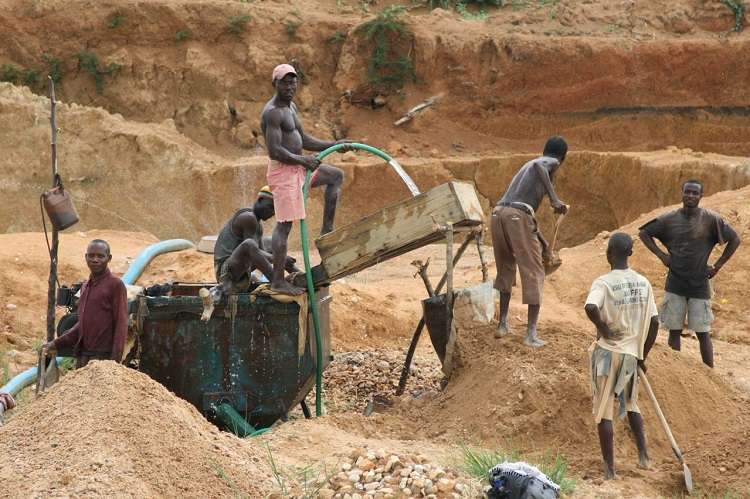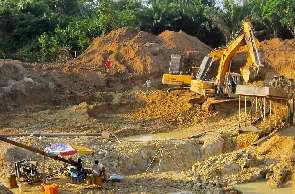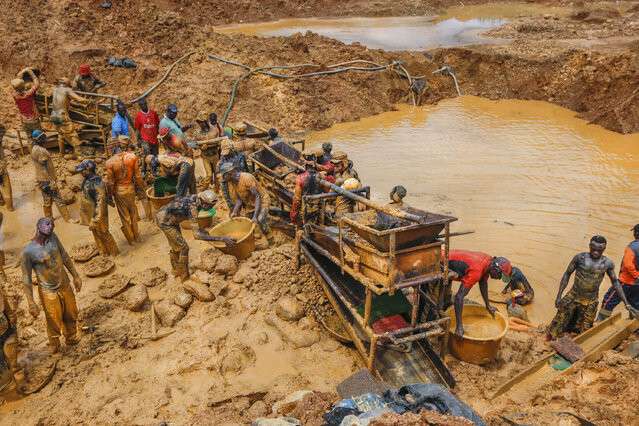Ghana, a country renowned for its rich gold deposits, has been plagued by the menace of illegal mining, popularly known as galamsey. This illicit activity has wreaked havoc on the environment, leaving in its wake a trail of destruction and devastation.
The environmental effects of galamsey in Ghana are multilayered and far-reaching, with severe consequences for the country’s ecosystem.
Deforestation and habitat destruction are among the most visible effects of galamsey as forests that were once teeming with wildlife are being cleared at an alarming rate to make way for mining activities.
This leads to a loss of biodiversity and contributes to climate change. The removal of trees and vegetation also increases soil erosion, as the soil is no longer held in place by tree roots.
Furthermore, soil degradation and loss of biodiversity are other significant effects of galamsey. The excavation and alteration of land for mining activities lead to soil degradation, contamination with pollutants such as mercury and cyanide, and physical disturbance of the ground.
As such, this environmental damage leads to soil erosion and reduced fertility, causing crop growth difficulties and exacerbating food insecurity in affected areas.
Moreover, water pollution is another devastating consequence of illegal mining. The use of hazardous substances like mercury and cyanide in artisanal and small-scale gold mining (ASGM) has contaminated major rivers, posing a significant threat to aquatic life and human health.
Likewise, water pollution imperils irrigation and drinking water, causing food insecurity and health issues, including waterborne diseases.
Furthermore, illegal mining in Ghana poses significant border security concerns. The unregulated nature of illegal mining activities in remote border areas makes it challenging for authorities to monitor and control.
This leads to a porous border, allowing criminals and illegal activities to cross into neighboring countries. Criminal networks exploit these vulnerabilities, smuggling gold, weapons, and other illicit goods.
As such, illegal mining’s unregulated cross-border movement hinders tracking and monitoring, while encroachment on disputed territories risks sparking border disputes with neighboring countries, potentially fueling diplomatic tensions and conflict.
Accordingly, the Upper East Regional Security Council (REGSEC) has issued a directive to illegal miners occupying portions of land in the border community of Sapelliga, ordering them to dismantle their operations, remove their equipment, and vacate the area immediately.
The Head of the Upper East REGSEC and Regional Minister, Hafiz Bin Saleh cited environmental destruction and the removal of critical boundary pillars as reasons for the council’s directive to illegal miners in Sapelliga.
“Please, if you want to continue operating here, do the right thing. We are going to contact the Minerals Commission so that they make this place available to prospective miners so that you would be licensed and then we allow you to operate. But what you are doing currently is unacceptable, it’s highly unacceptable”.
Hafiz Bin Saleh, Head of the Upper East REGSEC
More so, the Ghana Boundary Commission, which supported the REGSEC’s operation, stated that the goal of the exercise was to crack down on the illegal mining activities that have been causing environmental degradation and threatening national security in the region.
Furthermore, the Commissioner General of the Commission, Major General Emmanuel Kotia stated that illegal miners’ activities continue to interfere with Ghana’s boundary pillars with Burkina Faso.
“Some of these activities led to the removal of international boundary pillars and for that matter, there was no clarity so far as the markings of the boundary is concerned. We have quite a sizeable number of people coming from Burkina Faso to do a lot of illegal activities here… While these boundary pillars are removed, some of our territories can be taken or probably can be declared as part of Burkina Faso because these markings are not visible on the ground,”
Major General Emmanuel Kotia
Curbing Illegal Mining: A Comprehensive Approach Needed
This illicit activity of illegal mining has devastating environmental and social consequences, necessitating a comprehensive approach to curb it.


To effectively address galamsey, strengthening legal frameworks and regulations is crucial. Reviewing and amending existing laws to ensure they are effective in preventing galamsey is essential.
Additionally, enforcement and monitoring by security agencies and environmental authorities must be increased to detect and deter illegal mining activities.
Furthermore, community engagement and education are vital to gain the support of local communities in the fight against galamsey.
Providing alternative livelihoods and economic opportunities can incentivize communities to reject illegal mining.
Also, technology, such as drones and satellite imaging, can be utilized to detect and track illegal mining activities.
Moreover, collaboration and international cooperation are necessary to address cross-border illegal mining.
As such, Ghana must work with neighboring countries and international organizations to share best practices and develop effective strategies to combat galamsey.
More so, establishing legal small-scale mining schemes and providing support for artisanal miners to transition to legal operations can help reduce illegal mining.
Environmental rehabilitation of degraded lands and water bodies affected by galamsey is also essential to restore ecosystems.
Furthermore, the government can offer economic incentives and engage in public awareness campaigns to encourage legal mining operations and raise awareness about the environmental and social impacts of galamsey.
As such, demonstrating strong political will and leadership is crucial to combat illegal mining and protect Ghana’s natural resources.
Curbing illegal mining in Ghana requires a multi-faceted approach that involves government, civil society, and community engagement, as such, Ghana can effectively reduce galamsey, protect its environment, and promote sustainable development by implementing these strategies.
READ ALSO: Ghana’s Currency Woes, Turning Crisis into Economic Opportunity



















